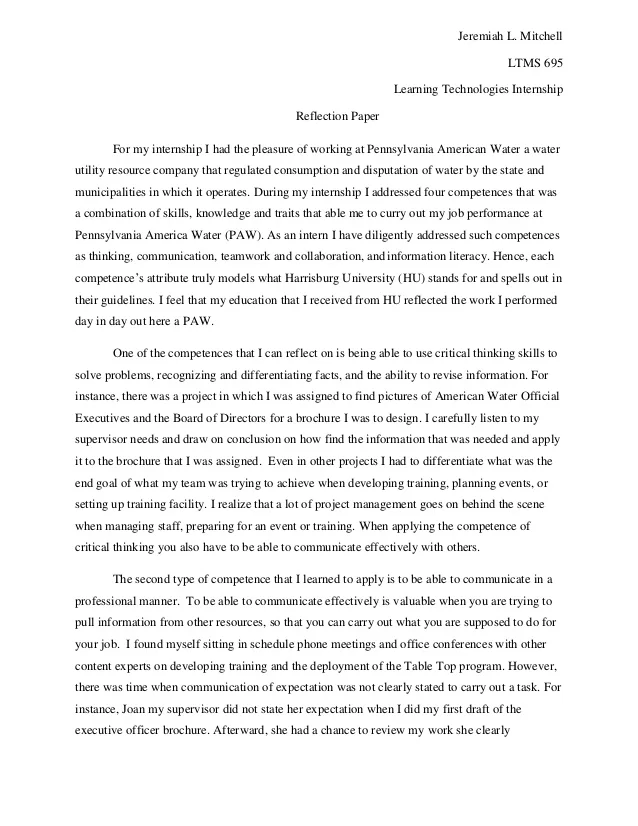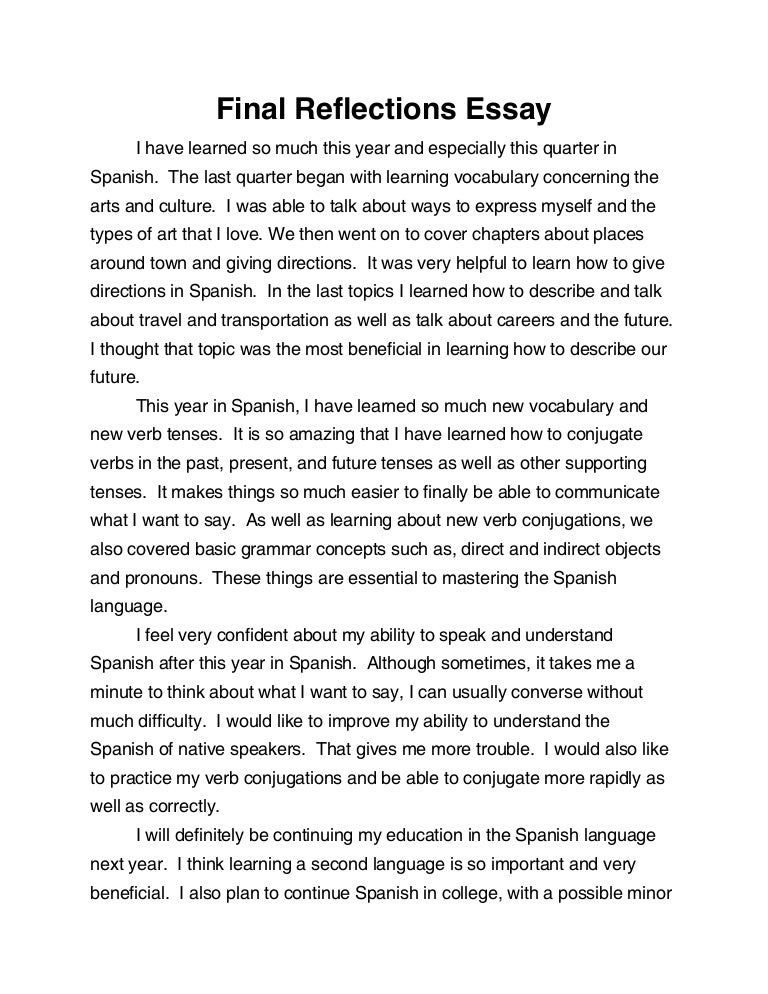
Course Completion Reflective Essay. In the process of completing this course, I have improved on many areas of my reading, writing and research skills, honing my ability to read critically and write thoughtfully and creatively.9,7/10() Since it is a paper about reflection, express your opinion, supporting it with examples from the course. Project – The structure for a reflection paper about a project has identical guidelines to that of a course. One of the things you might want to add would be the pros and cons of the course The main kinds of reflection papers are professional reflection papers and educational reflection papers. Some examples of educational reflection papers include “a reflection of what I learned in class” and “an essay about English class experience.”
Graduate Course Reflection Paper Sample & Guide - MyHomeworkWriters
Writing a graduate course reflection paper provides students with the opportunity to consider how their personal experiences and observations shape their thinking and acceptance of new ideas, course reflection paper example.
Instructors and professors often course reflection paper example their students to write graduate course reflection papers to encourage them to explore their ideas about their respective courses.
As a student, reflective writing can enhance your analytical skills since you will have to express what you think, and more importantly, how and why you think a certain way. Additionally, writing a graduate course reflection paper requires you to acknowledge that your preconceived ideas and assumptions shape your thinking.
Most students wonder how their professors assess graduate course reflection papers. What do they look for? How can your ideas or experiences be right or wrong? Most instructors expect their students to critically engage with concepts from their respective courses. This requires making connections between experiences, opinions, and observations.
In a single paragraph, introduce your readers to the topic while integrating your key concepts into the opening narrative. Remember, this should be a short paragraph that informs your readers what you intend to discuss and should, therefore, set the stage for continuing to the subsequent sections of your graduate course reflection paper. Course reflection paper example, your introduction should be between 3 to 6 sentences long.
While it can be difficult to write a graduate course reflection paper, worry not because My Homework Writers is, therefore, your assistance. com has, for many years now been the best online essay help service. At My Homework Course reflection paper example, students can get assistance on their essays regardless of their course, course reflection paper example, at pocket-friendly prices.
Regarding writing graduate course reflection papers, some services students can access include:. The type of Reflection Paper you have to write about to a great extent dictates your entire writing process. The main kinds of reflection papers are professional reflection papers and educational reflection papers. Find a source of inspiration. Rather than generating topic ideas course reflection paper example the head, look outward for some writing inspiration.
For instance, in this case, your inspiration should be your graduate course. Before settling on a topic, choose a theme, and ensure you understand what you want your angle to be. Think of any personal experiences you wish to share and the course reflection paper example insights you have. Also, think about the main argument or message to use for your essay, course reflection paper example. Notetaking is an essential course reflection paper example of writing a graduate course reflection paper.
It helps organize your course reflection paper example so you can write a final draft as fast and course reflection paper example easily as possible. Try listing as many ideas as possible, then selecting the best ones. When you clear this step, you should have a basic outline to guide your writing process. You should have a simple bullet list of ideas you want to include in your reflection essay by now. Organize these ideas to create a flow.
Below is a basic outline of how you can organize your ideas:. Take your time and fill out each section with meaningful writing. At this point, it should not matter much whether your writing sounds good or not. Writing reflective essays, also course reflection paper example as reflection papers or reflective papers, is as easy as the steps below, course reflection paper example. The first step of writing in the essay is selecting a suitable topic.
Therefore, take your time and choose a topic wisely. Depending on what your subject is, you may have to reflect, watch, imagine, listen, or read, course reflection paper example. Take a few minutes to vividly think or re-experience your topic. Write down or type all the ideas you can think about your topic. You should aim to describe your subject as vividly as possible. Think about some sensory details, e. Read your questions, understand them, then embark on answering them.
This does not necessarily have to be in perfect sentence or formal essay form. Your aim should be to gather as many ideas as possible. The language and style you adopt in reflective writing largely depends on your assignment instructions and discipline. Ideally, reflection papers should have a minimum of words and a maximum of words. Sometimes reflection papers exceed the word maximum limit depending on the content of the writer.
Most reflection papers, including graduate course reflection papers, follow a basic structure that includes the parts below:.
This section mainly dwells on the topic of the essay and what the paper will mainly focus on. You can also mention the significance of the subject, and how to develop it. The body paragraphs form the bulk of a reflection paper. They contain detailed descriptions of the topic, a deep analysis of the chosen theme, and a general assessment of the subject.
This section is concise and focuses on wrapping up the essay in a few words. A conclusion paragraph usually ends reflection paper.
The conclusion of a reflective essay should focus on bringing the essay together by summarizing the points made throughout the essay, and what the writer learned as a result. When writing this paragraph, try including some points on the change in your behaviors, and attitudes. Also, explain how and why the change occurred. According to reflective essay Englishthis is how to write a Reflection in English:. Synonymous with professional programs such as nursing, education, forensics, course reflection paper example, and business, reflection is an essential component of linking theory and practice.
When students write graduate course reflection papers, they have to reflect on their experiences throughout the course. The basis of this should be an evaluation of the ideas gathered from class. Depending on your practice and observations, you can assess various approaches and theories, while evaluating your skills and knowledge within the professional field.
Graduate course reflection papers or experiential essays are very different from other kinds of essays like argumentative or descriptive essays. This type of essay infers directly on the experience of the writer, without using academic citations or other kinds of references.
What is more, the writer has to reflect or read a lot on their specific subjects before they begin the writing process. All a writer course reflection paper example to do is formulate an interesting topic, recall specific experiences, and attempt to reflect course reflection paper example it. In a way, it is beneficial that this type of writing does not require building any theoretical frameworks for the essay.
On the other hand, while most writers are in the dark when it comes to these types of essays, they have to be creative, employ their imagination, and simultaneously describe and reflect on their experiences.
All of this should happen in a precise and logical manner. Therefore, when it comes to writing these kinds of essays, logic and imagination always go hand in hand. Essentially, all pieces of text someone writes are a kind of learning.
During the writing process, writers learn about themselves, their values, course reflection paper example, attitudes, and feelings towards specific topics, course reflection paper example. Through writing, people learn more about themselves and reflect more on the specific experiences they wish to describe. In this regard, your ultimate goal is not to prove your writing skills. Rather, course reflection paper example, it is a way of learning which puts you in a position of awareness about your habits, weaknesses, and strengths.
David Kolb elaborates on a model of experiential learning, which consists of four major parts that you should include in your essay, i. To make your essay more coherent and organized, we recommend employing this model. This refers to events that trigger a learning cycle. While these are often specific experiences, they can also include reading, personal research, or even consulting other people. When focusing on concrete experiences that sparked your learning, ask yourself questions such as:.
In the second phase, take a step back from your experiences and instead observe and reflect upon them. This could involve identifying similarities, differences, patterns, and results of specific actions. Ask course reflection paper example questions such as:. From your observations and reflections regarding your experience, start to generalize and develop abstract concepts. Seek to identify things like:. In the final stage of the model, apply any newly discovered principles, and test the implications of these concepts in new situations.
The experimentation or testing during the fourth stage could lead to other concrete experiences. Based on these new experiences, you can make additional observations and reflections, formulate or refine principles, and apply them to see if they are true.
Therefore, this model is essentially a spiral, course reflection paper example, i. Depending on your course and experiences, you can have numerous topics to choose from. However, you must draw inspiration from experiences that have had a tremendous influence on your life, e. It goes without saying that at such a high level as this, you should use standard English.
This implies that you should employ the correct terminology relative to the field you will be covering your experience in. It is also vital for long, complex sentences, to prove your mastery of the English language and your writing skills. In this form of writing, what other people have to say about your experiences does not matter—only your experiences and reflections regarding the subject matter.
After writing your essay, proofread it and check for things such as style, course reflection paper example, grammar and spelling, internal logic, and coherence. You should only develop one idea throughout your essay. If you are not very confident in your proofreading abilities, ask someone more competent to handle it for you. I have been a student at [institution] for six semesters, course reflection paper example, and during the course of my stay, I have learned and grown more than I thought was possible.
How to Write a Reflection Assignment
, time: 5:32How to Write a Reflection Paper: Guide with Example Paper | EssayPro

Since it is a paper about reflection, express your opinion, supporting it with examples from the course. Project – The structure for a reflection paper about a project has identical guidelines to that of a course. One of the things you might want to add would be the pros and cons of the course The main kinds of reflection papers are professional reflection papers and educational reflection papers. Some examples of educational reflection papers include “a reflection of what I learned in class” and “an essay about English class experience.” Course Completion Reflective Essay. In the process of completing this course, I have improved on many areas of my reading, writing and research skills, honing my ability to read critically and write thoughtfully and creatively.9,7/10()
No comments:
Post a Comment